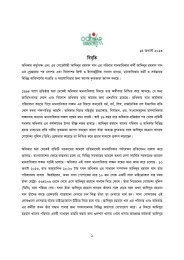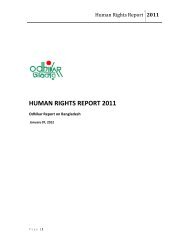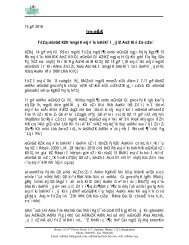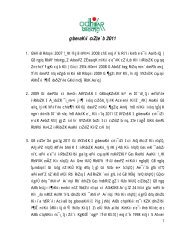Please - Odhikar
Please - Odhikar
Please - Odhikar
Create successful ePaper yourself
Turn your PDF publications into a flip-book with our unique Google optimized e-Paper software.
and continues to harm victims and witnesses of a crime, arbitrary power prevails and as such,<br />
rule of law is absent. By rule of law, Professor Wade prefers the connotation of law and order<br />
within community rather than anarchy or disorder. Thus if a rape victim in a community is<br />
continuously threatened by perpetrators not to file a case in a police station and she does not find<br />
protection with police, can it be said that rule of law exists in that particular community? In<br />
interpreting the concept of rule of law, Professor Wade adds that judicial decisions in disputed<br />
cases are important for rule of law and declared rules of law should provide in matters both of<br />
substance and of procedure. Thus even if the law of the land does not have provision for<br />
protection of victims and witnesses, it is the judiciary which can, by taking into consideration of<br />
particular circumstances and by its judicial interpretations/decisions ensure such protection to<br />
ensure de facto rule of law.<br />
Human security perspective of victims and witness protection<br />
Unlike traditional concepts of security, which focus on defending borders from external military<br />
threats, human security is concerned with the security of individuals. For some proponents of<br />
human security, the key threat is violence; for others the threat agenda is much broader. In a<br />
legal and prosecutional perspective, victims and witnesses need to be protected for their survival<br />
and participation in the prosecution<br />
Why survival? Survival is a right<br />
According to Article 3 of the Universal Declaration of Human Rights (UDHR), everyone has the<br />
right to life, liberty and security of person. This provision speaks of survival rights of victims<br />
and witnesses. If victims and witnesses do not survive and die due to post-offence vengeance of<br />
the offender/perpetrator, it amounts to violation of their rights for a second time.<br />
Why participation? Participation is a right<br />
If security of victims and witnesses is at stake, they cannot take part in prosecution of the<br />
offender. They are supposed to produce evidence and give testimonies against the offender.<br />
Proper trial of any offence requires participation of victims and witnesses in prosecution. Their<br />
evidence is the best evidence and may be the only evidence against the offender, so their<br />
protection is essential. This has been asserted in the Universal Declaration of Human Rights<br />
(UDHR), which states in its Article 10 that "everyone is entitled in full equality to a fair and<br />
public hearing by an independent and impartial tribunal, in the determination of the rights and<br />
obligations…"<br />
Human rights perspective of victims and witness protection<br />
Right to protection of law is a fundamental right of victims and witnesses. Article 31 of the<br />
Constitution of Bangladesh ensures this right by stating that enjoyment of the protection of law,<br />
and to be treated in accordance with law, is the inalienable right of every citizen, wherever he<br />
may be, and of every other person for the time being within Bangladesh, and in particular no<br />
action detrimental to the life, liberty, body, reputation or property of any person shall be taken<br />
except in accordance with law.<br />
Victims and witnesses, like common human beings, have universal inherent right to protection.<br />
As stated in Article 12 of the Universal Declaration of Human Rights (UDHR), "no one shall be<br />
Report 2005<br />
151











